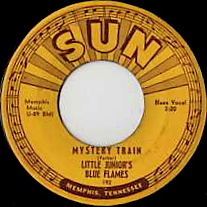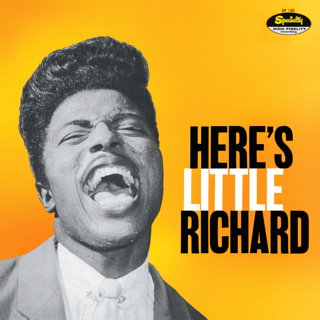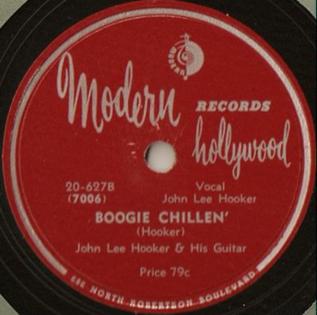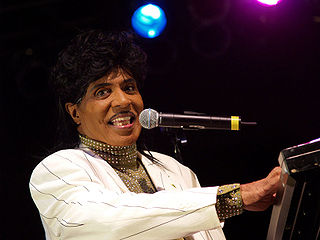
"Rocket 88" is a song that was first recorded in Memphis, Tennessee, in March 1951. The recording was credited to "Jackie Brenston and his Delta Cats", who were actually Ike Turner and his Kings of Rhythm. The single reached number one on the Billboard R&B chart.

Mathis James Reed was an American blues musician and songwriter. His particular style of electric blues was popular with blues as well as non-blues audiences. Reed's songs such as "Honest I Do" (1957), "Baby What You Want Me to Do" (1960), "Big Boss Man" (1961), and "Bright Lights, Big City" (1961) appeared on both Billboard magazine's rhythm and blues and Hot 100 singles charts.

Vee-Jay Records is an American record label founded in the 1950s, located in Chicago and specializing in blues, jazz, rhythm and blues and rock and roll.

Eddie Harris was an American jazz musician, best known for playing tenor saxophone and for introducing the electrically amplified saxophone. He was also fluent on the electric piano and organ. His best-known compositions are "Freedom Jazz Dance", popularized by Miles Davis in 1966, and "Listen Here".

"Good Golly, Miss Molly" is a rock 'n' roll song first recorded in 1956 by American musician Little Richard and released in January 1958 as Specialty single 624, and later on Little Richard in July 1958. The song, a jump blues, was written by John Marascalco and producer Robert "Bumps" Blackwell. Although it was first recorded by Little Richard, Blackwell produced another version by the Valiants, who imitated the fast first version recorded by Little Richard, not released at that time. Although the Valiants' version was released first, Little Richard had the hit, reaching No. 4. Like all his early hits, it quickly became a rock 'n' roll standard and has subsequently been recorded by hundreds of artists. The song is ranked No. 92 on the Rolling Stone magazine's list of the 500 Greatest Songs of All Time.

"Mystery Train" is a song written and recorded by American blues musician Junior Parker in 1953. Originally performed in the style of a Memphis blues or rhythm and blues tune, it was inspired by earlier songs and later became a popular rockabilly song, as first covered by Elvis Presley, then numerous others.

Here's Little Richard is the debut album by American musician Little Richard, released on March 4, 1957. Promoted as "six of Little Richard's hits and six brand new songs of hit calibre", the album compiles many of the A-sides and B-sides from Richard's hit singles including the Billboard top 40 entries "Tutti Frutti", "Long Tall Sally", "Slippin' and Slidin'", "Rip It Up" and "Jenny, Jenny" and the top 10 Rhythm and Blues Best-Sellers hits "Ready Teddy", "She's Got It" and "Miss Ann".

"Boogie Chillen'" or "Boogie Chillun" is a blues song first recorded by John Lee Hooker in 1948. It is a solo performance featuring Hooker's vocal, electric guitar, and rhythmic foot stomps. The lyrics are partly autobiographical and alternate between spoken and sung verses. The song was his debut record release and in 1949, it became the first "down-home" electric blues song to reach number one in the R&B records chart.

Tutti Frutti is a song written by Little Richard and Dorothy LaBostrie, recorded in 1955, which was his first major hit. With its energetic refrain, often transcribed as "A-wop-bop-a-loo-mop-a-lop-bam-boom!", and its hard-driving sound and wild lyrics, it became not only a model for many future Little Richard songs, but also for rock and roll itself. The song introduced several of rock music's most characteristic musical features, including its loud volume, powerful vocal style, and distinctive beat and rhythm.

Rosco N. Gordon III, sometimes billed as Roscoe Gordon, was an American blues singer, pianist, and songwriter. He is best known for his hit songs "Booted," (1952), "No More Doggin'" (1952), and "Just a Little Bit" (1960). Gordon was a pioneer of the Memphis blues style. He played piano in a style known as the "Rosco rhythm," with the emphasis on the off-beat. This rhythm was an influence on later musical styles such as Jamaican ska and reggae.

"I Wish You Would" is a song recorded by Chicago blues musician Billy Boy Arnold in 1955. It was developed while Arnold was performing with Bo Diddley and incorporates a Diddley-style rhythm. Called "a timeless Chicago blues classic", "I Wish You Would" is Arnold's best-known song and has been recorded by several artists, including the Yardbirds, who recorded it for their debut single in 1964.

Edwin Joseph Bocage, known as Eddie Bo, was an American singer and pianist from New Orleans. Schooled in jazz, he was known for his blues, soul and funk recordings, compositions, productions and arrangements. He debuted on Ace Records in 1955 and released more single records than anyone else in New Orleans other than Fats Domino.
"Money Honey" is a song written by Jesse Stone, which was released in September 1953 as the first single by Clyde McPhatter backed for the first time by the newly formed Drifters. McPhatter's voice, but not his name, had become well known when he was the lead singer for Billy Ward and the Dominoes. The song was an immediate hit and remained on the rhythm and blues chart for 23 weeks, peaking at number 1. Rolling Stone magazine ranked it number 252 on its list of the 500 Greatest Songs of All Time. The recording was reported to have sold more than two million copies by 1968.

Playin' Possum is the 1982 debut solo album by Moe Tucker, who was the drummer in the Velvet Underground. The album includes a number of renditions of classic rock and roll songs,, as well as renditions of more modern rock songs. Tucker performs every instrument on the album and recorded it in her living room, dubbed "Trash Records". "Ellas" was dedicated to Bo Diddley.

Little Richard's Greatest Hits is an album of Little Richard songs re-recorded in 1964 and first released in the US by Vee-Jay Records in January 1965. It features updated versions of twelve of his best-known songs originally recorded in the 1950s for Specialty Records. Some of these re-recordings use different musical arrangements, including unusual syncopation, tambourine and jazz horns.

This page is a discography for American musician Little Richard (1932–2020). Described as "the architect of rock and roll", Little Richard was a pioneering singer-songwriter whose career also encompassed rhythm and blues, soul, and gospel. He began his recording career in 1951, signing to RCA Victor, releasing his first singles, and his first album in 1957, although he released his last album in 1992, he continued to tour into the 21st century. He attained international success after signing with Specialty Records in 1955.
"Eddie My Love" is a 1956 doo wop song. According to BMI and ASCAP, the song was written by Maxwell Davis (BMI), Aaron Collins, Jr. (ASCAP), and Sam Ling (BMI). Maxwell Davis played sax on the Teen Queens record. Aaron Collins was the brother of the Teen Queens. Sam Ling was an alias of Saul Bihari, co-founder of Modern, RPM, and other labels.
Willie C. Cobbs was an American blues singer, harmonica player and songwriter. He is best known for his song "You Don't Love Me".

"You Don't Love Me" is a rhythm and blues-influenced blues song recorded by American musician Willie Cobbs in 1960. Adapted from Bo Diddley's 1955 song "She's Fine She's Mine", it is Cobbs' best-known song and features a guitar figure and melody that has appealed to musicians in several genres.

"Just a Little Bit" is an R&B-style blues song recorded by Rosco Gordon in 1959. It was a hit in both the R&B and pop charts. Called "one of the standards of contemporary blues," "Just a Little Bit" has been recorded by various other artists, including Little Milton and Roy Head, who also had record chart successes with the song.















